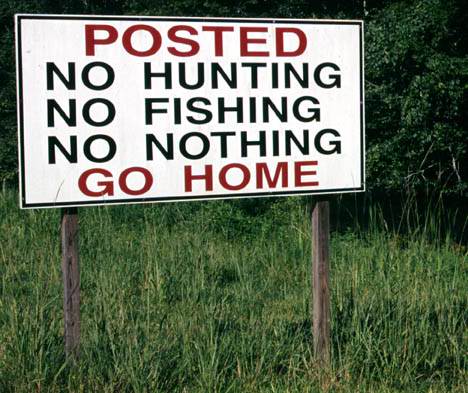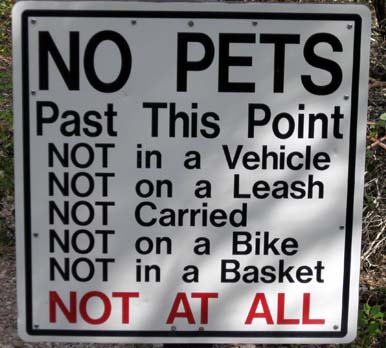HSUS wildlife policy: ‘Guilty Until Proven Innocent’
 Today’s look into the history of the Humane Society of the United States comes through the courtesy of a HumaneWatch reader who sent us a document we'd never seen before. It's a 33-year-old newsletter from something called the National Association for Sound Wildlife Programs. (We can't find any evidence that the organization exists anymore.)
Today’s look into the history of the Humane Society of the United States comes through the courtesy of a HumaneWatch reader who sent us a document we'd never seen before. It's a 33-year-old newsletter from something called the National Association for Sound Wildlife Programs. (We can't find any evidence that the organization exists anymore.)
We're posting a brief excerpt from this 1977 publication in the HumaneWatch document library, because we think it shows a rather radical approach (even for its time) of preferring animals over human beings. Even in cases where the only thing people have to go on is a wild guess.
If you care about hunting, fishing, zoos, aquariums, wildlife conservation, or the private ownership of exotic animal species as pets, you’ll want to read this. It’s a rare glimpse into the mindset that gave us some of today’s (in our opinion) more backward policy approaches to wildlife. And HSUS was right in the thick of it.
Here’s what this document shows.
 In June 1974 an organization called the Wild Canid Survival and Research Center (started by Marlin Perkins and based in St. Louis) hosted a Washington, DC meeting during which 14 organizations agreed on 26 principles that “reflect the viewpoint of this group.” The members included HSUS, the Fund for Animals (which HSUS would later annex), and the HSUS-related International Fund for Animal Welfare.
In June 1974 an organization called the Wild Canid Survival and Research Center (started by Marlin Perkins and based in St. Louis) hosted a Washington, DC meeting during which 14 organizations agreed on 26 principles that “reflect the viewpoint of this group.” The members included HSUS, the Fund for Animals (which HSUS would later annex), and the HSUS-related International Fund for Animal Welfare.
Later that year, the groups met again in St. Louis and formally ratified those 26 principles. It called itself the Wildlife and Habitat Coordinating Committee (another short-lived group), which may ring a bell to those of you who lived through the Civil Rights movement and recall its buzzwords. (Remember the Student Nonviolent Coordinating Committee?)
A press release on October 1974, also reproduced in this newsletter excerpt, spells out all 26 things that HSUS and its peer groups said they wanted. You can read the whole list for yourself. But here, verbatim, are the ones that caught our eye, and some thoughts about each:
[The] sale of non-domestic animals as pets, be they indigenous to the U.S. or imported, [should] be restricted at [the] state and federal level to possession for educational, research, and/or conservation purposes only, with specified exemptions (eg. Gerbil, guinea pig, parakeet).(*)
The asterisk at the end of this one leads to a statement that “the group was for opposition to ‘private ownership and private propagation of endangered species.’ This announcement was met with cheers and applause from the members present.”
 The way we read it, the statement itself would allow for zoos and aquariums, but the opposition to all “private ownership” of endangered species would not. We also don't see any loopholes big enough for a pet fish.
The way we read it, the statement itself would allow for zoos and aquariums, but the opposition to all “private ownership” of endangered species would not. We also don't see any loopholes big enough for a pet fish.
All commercial exploitation (as distinct from non-commercial native subsistence hunting) of wild animal products (fur, skins, whale oil, etc.) [should] be banned. (*1)
This one, too, had a footnote, wondering aloud if “the use and manufacture of antivenin would be banned.” Good question. It’s hard to protect people against snake bites without “exploiting” a snake to collect venom samples for producing the antidote.
And who should get to decide how to distinguish “commercial” use of animals from “non-commercial” use? Who’s a “native” and who isn’t? As we learned in our interview last month with the Inuit leader Aaju Peter, these questions are still unanswered nearly 40 years later. And the statement above seems to presume that “native” people don’t have the right to earn a living from whatever they might hunt.
All commercial industries involved in collecting wild (non-domestic) foods (fish, etc.) [should] be strictly regulated. Development of alternative food sources should be sought, (soy bean fields, oyster and fish farms, etc.).
This has a sort of “locavore” ring to it, no? If you live in Michigan, apparently you shouldn’t have easy access to Pacific salmon. If you live in a desert region, we suppose you’re supposed to do without any fish at all—unless it can be “grown” in your backyard. And that Chilean Sea Bass we love so much? Forget about it.
Immediate instigation of moratoria on hunting (of grizzly bears or other species) when there is any element of doubt as to their population in a given area, pending further study.
This one is ridiculous. The phrase “any element of doubt as to their population” can turn every “yes” into a “no,” because—well, who on earth can ever say for sure how many bears, deer, or pheasant are living on a particular plot of land? It’s an impossible standard for hunters to meet. Which, we think, was the point.
International monitoring and regulation of any human interventions of ecosystems which may have regional, international, or globally deleterious consequences.
Wow. We're not going to get all tinfoil-hat-new-world-order on you, but the idea of the United Nations or some other body telling some county in Illinois where they’re allowed to build a dam or a reservoir just doesn’t seem right. And, as with all of these Utopian rules, it all hinges on who gets to decide what “may” have a negative impact.
Let’s face it: Practically everything human beings do in the wild—camping weekends, fly fishing, snowmobiling, farming, logging—all of it “may have … deleterious consequences” to some form of wildlife or other. But if we stop doing all of that, just how human would we be?
It’s practically impossible for people to live without impacting the natural environment. But we’re “a part of nature” too, right? HSUS and its allies seem to have been saying that we should be “apart from nature” at all times.
Now, we should warn you that we're reproducing this last one exactly as it appeared. ALL CAPS and everything:
Immediate intervention to prevent any disruption to an ecosystem by a corporation or development when there is no evidence to prove that human interference will have no deleterious consequences, i.e. GUILTY UNTIL PROVEN INNOCENT.
 Honest. We didn’t make up that last part.
Honest. We didn’t make up that last part.
This sounds like a precursor to the environmental movement’s “precautionary principle,” the concept that you should make scientists and farmers (and everyone) “prove a negative” before permitting them to do practically anything.
It’s the same rationale that propels green groups to lobby against the cultivation of genetically modified food crops. “Who cares if the boost in food production can keep a billion or two people from starving?” the logic goes. “It might possibly be harmful; and unless you can prove it isn’t, you shouldn’t be allowed to do it. Period.”
We're starting to understand why HSUS allied itself very early on with the nascent environmental movement. They have all the cool trump cards.



